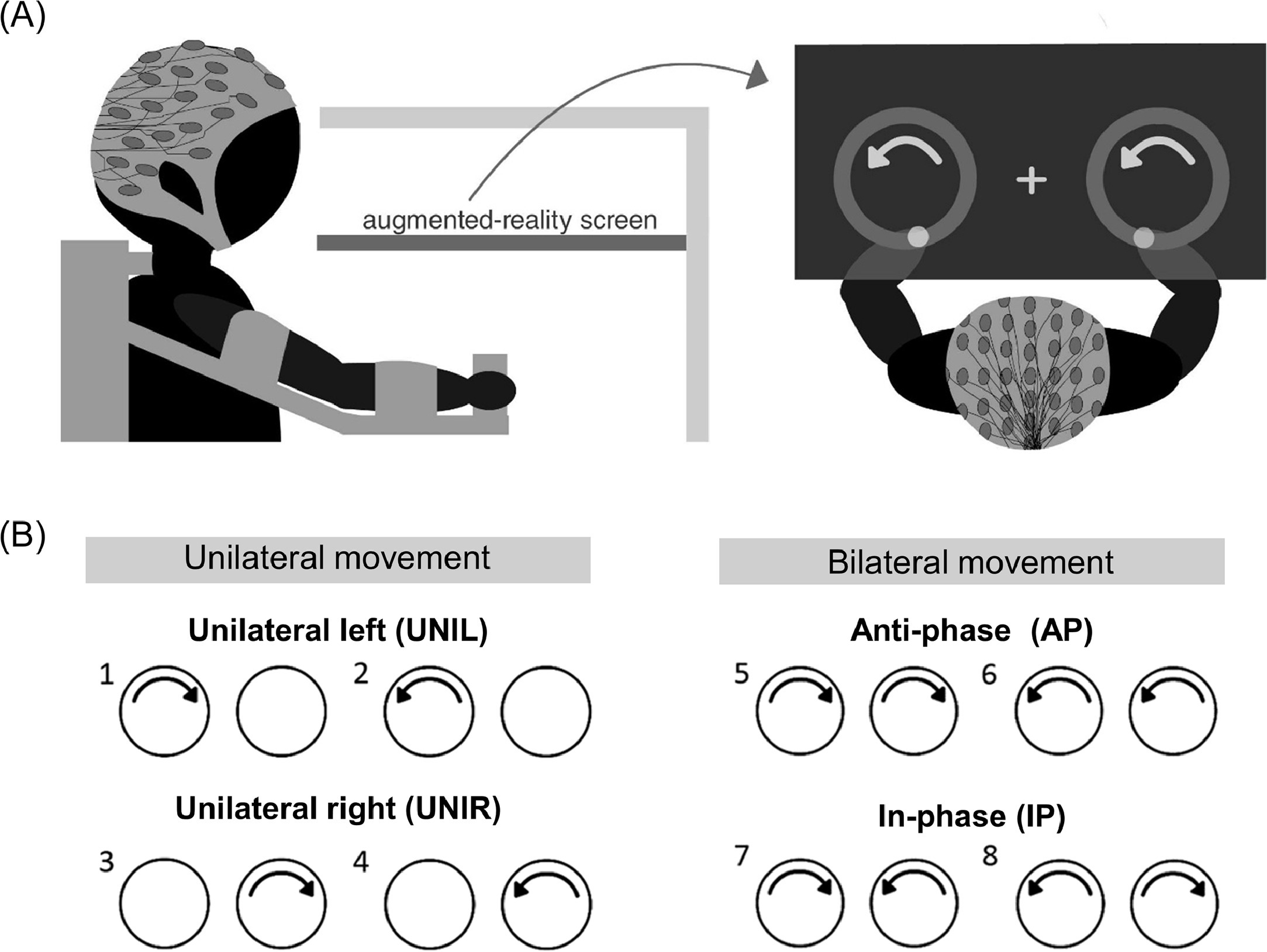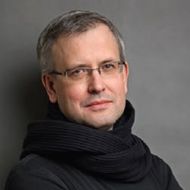Two-handed Movements Require More Neural Effort As People Grow Older

A team of researchers from Max Planck Institute for Human Cognitive and Brain Sciences (Leipzig) has discovered that the age-related decline in bilateral anti-phase movement is linked to differences in alpha and beta neural activity. Among the researchers was Vadim Nikulin, Leading Research Fellow of the Centre for Cognition & Decision Making at HSE University.
The research, entitled ‘Alpha and beta neural oscillations differentially reflect age-related differences in bilateral coordination’ has been published in the journal Neurobiology of Aging.
Bilateral coordination is the ability to coordinate the left and right sides of the body while in motion—an essential skill in everyday life. Those with impaired bilateral coordination can have difficulty with tasks such as clapping their hands or opening jars.
There are two types of coordination: in-phase and anti-phase. During in-phase movements (such as catching a ball with both hands), the same muscles on both sides contract synchronously. During anti-phase movements (such as moving both arms to the same side at once), the muscles contract in an alternating fashion.
Aging has been linked to a decline in bilateral coordination, particularly anti-phase coordination. The researchers proposed that age-related changes in in-phase and anti-phase coordination in older people are related to the fact that these processes are controlled by different mechanisms in the brain linked to neural oscillations.
To test this hypothesis, the researchers conducted an experiment using electroencephalography (EEG). The participants comprised 25 younger subjects with an average age of 26, and 25 older subjects with an average age of 70.

The subjects sat at a transparent table featuring a depiction of one out of eight possible circular arm movements. They were able to see their arms under the table. The subjects were asked to repeat a circular motion shown on the screen in time with a metronome. Two of the eight possible motions were in-phase and two were anti-phase. The remaining four motions required the use of one arm only. The researchers used multichannel EEG to record the subjects’ brain activity.
The researchers discovered that compared to the younger group, the older subjects displayed lower synchronization between different sides of the body during anti-phase movements. This explains why, for example, it becomes more difficult to perform such movements with age.
Decreased synchronization during anti-phase movements was also linked to differences in brain activity while performing the movements. In younger subjects, the power of alpha waves in the right, non-dominant hemisphere of the brain decreased less during in-phase movements than during anti-phase movements. In older subjects, the power of alpha waves fell by the same amount during both types of movement.
It is suggested that the power of alpha waves is linked to the level of active involvement in solving the given task. The lack of reduction in this power in the non-dominant hemisphere may reflect a compensation for the loss of these skills in older subjects, for example, that they need to more actively concentrate on the tasks.
Comparable differences were observed between the power of beta waves in both age groups. In the younger group, beta waves decreased equally with both types of movement, while in the older group, beta waves fell more during anti-phase movements than during in-phase movements. This greater decrease may also reflect the need for additional processing of sensorimotor information during anti-phase coordination.

Vadim Nikulin, Leading Research Fellow of the Centre for Cognition & Decision Making
‘Neural changes occur in the early stages of various pathologies of the brain. EEG measurement during bilateral movements could potentially uncover the early development of motor disorders, such as for instance Parkinson’s disease.’
Vadim Nikulin
See also:
HSE Researchers Discover Simple and Reliable Way to Understand How People Perceive Taste
A team of scientists from the HSE Centre for Cognition & Decision Making has studied how food flavours affect brain activity, facial muscles, and emotions. Using near-infrared spectroscopy (fNIRS), they demonstrated that pleasant food activates brain areas associated with positive emotions, while neutral food stimulates regions linked to negative emotions and avoidance. This approach offers a simpler way to predict the market success of products and study eating disorders. The study was published in the journal Food Quality and Preference.
HSE Neurolinguists Create Russian Adaptation of Classic Verbal Memory Test
Researchers at the HSE Centre for Language and Brain and Psychiatric Hospital No. 1 Named after N.A. Alexeev have developed a Russian-language adaptation of the Rey Auditory Verbal Learning Test. This classic neuropsychological test evaluates various aspects of auditory verbal memory in adults and is widely used in both clinical diagnostics and research. The study findings have been published in The Clinical Neuropsychologist.
Researchers at HSE Centre for Language and Brain Reveal Key Factors Determining Language Recovery in Patients After Brain Tumour Resection
Alina Minnigulova and Maria Khudyakova at the HSE Centre for Language and Brain have presented the latest research findings on the linguistic and neural mechanisms of language impairments and their progression in patients following neurosurgery. The scientists shared insights gained from over five years of research on the dynamics of language impairment and recovery.
Neuroscientists Reveal Anna Karenina Principle in Brain's Response to Persuasion
A team of researchers at HSE University investigated the neural mechanisms involved in how the brain processes persuasive messages. Using functional MRI, the researchers recorded how the participants' brains reacted to expert arguments about the harmful health effects of sugar consumption. The findings revealed that all unpersuaded individuals' brains responded to the messages in a similar manner, whereas each persuaded individual produced a unique neural response. This suggests that successful persuasive messages influence opinions in a highly individual manner, appearing to find a unique key to each person's brain. The study findings have been published in PNAS.
'We Are Creating the Medicine of the Future'
Dr Gerwin Schalk is a professor at Fudan University in Shanghai and a partner of the HSE Centre for Language and Brain within the framework of the strategic project 'Human Brain Resilience.' Dr Schalk is known as the creator of BCI2000, a non-commercial general-purpose brain-computer interface system. In this interview, he discusses modern neural interfaces, methods for post-stroke rehabilitation, a novel approach to neurosurgery, and shares his vision for the future of neurotechnology.
Smoking Habit Affects Response to False Feedback
A team of scientists at HSE University, in collaboration with the Institute of Higher Nervous Activity and Neurophysiology of the Russian Academy of Sciences, studied how people respond to deception when under stress and cognitive load. The study revealed that smoking habits interfere with performance on cognitive tasks involving memory and attention and impairs a person’s ability to detect deception. The study findings have been published in Frontiers in Neuroscience.
'Neurotechnologies Are Already Helping Individuals with Language Disorders'
On November 4-6, as part of Inventing the Future International Symposium hosted by the National Centre RUSSIA, the HSE Centre for Language and Brain facilitated a discussion titled 'Evolution of the Brain: How Does the World Change Us?' Researchers from the country's leading universities, along with health professionals and neuroscience popularisers, discussed specific aspects of human brain function.
‘Scientists Work to Make This World a Better Place’
Federico Gallo is a Research Fellow at the Centre for Cognition and Decision Making of the HSE Institute for Cognitive Research. In 2023, he won the Award for Special Achievements in Career and Public Life Among Foreign Alumni of HSE University. In this interview, Federico discusses how he entered science and why he chose to stay, and shares a secret to effective protection against cognitive decline in old age.
'Science Is Akin to Creativity, as It Requires Constantly Generating Ideas'
Olga Buivolova investigates post-stroke language impairments and aims to ensure that scientific breakthroughs reach those who need them. In this interview with the HSE Young Scientists project, she spoke about the unique Russian Aphasia Test and helping people with aphasia, and about her place of power in Skhodnensky district.
Neuroscientists from HSE University Learn to Predict Human Behaviour by Their Facial Expressions
Researchers at the Institute for Cognitive Neuroscience at HSE University are using automatic emotion recognition technologies to study charitable behaviour. In an experiment, scientists presented 45 participants with photographs of dogs in need and invited them to make donations to support these animals. Emotional reactions to the images were determined through facial activity using the FaceReader program. It turned out that the stronger the participants felt sadness and anger, the more money they were willing to donate to charity funds, regardless of their personal financial well-being. The study was published in the journal Heliyon.


